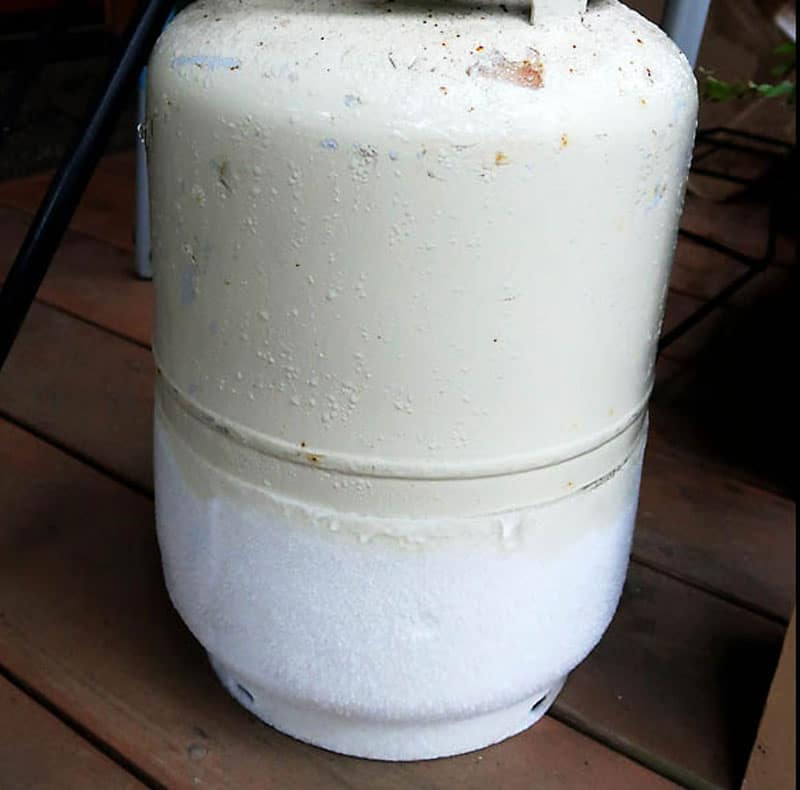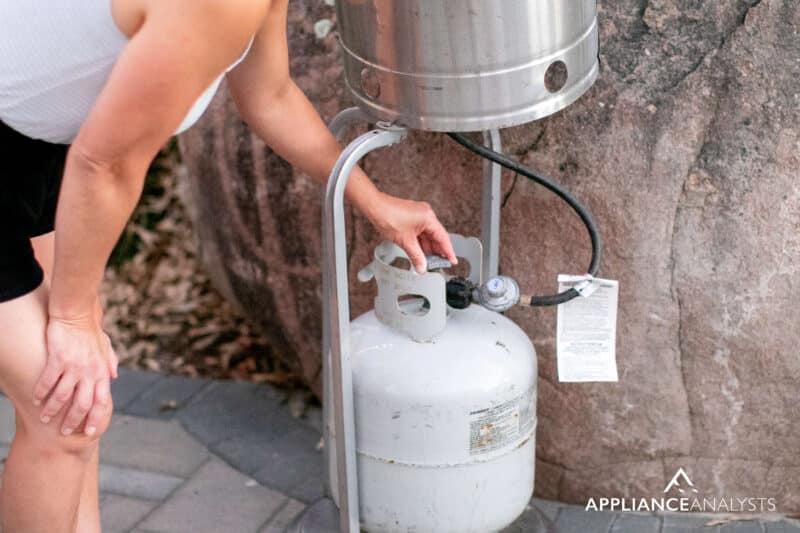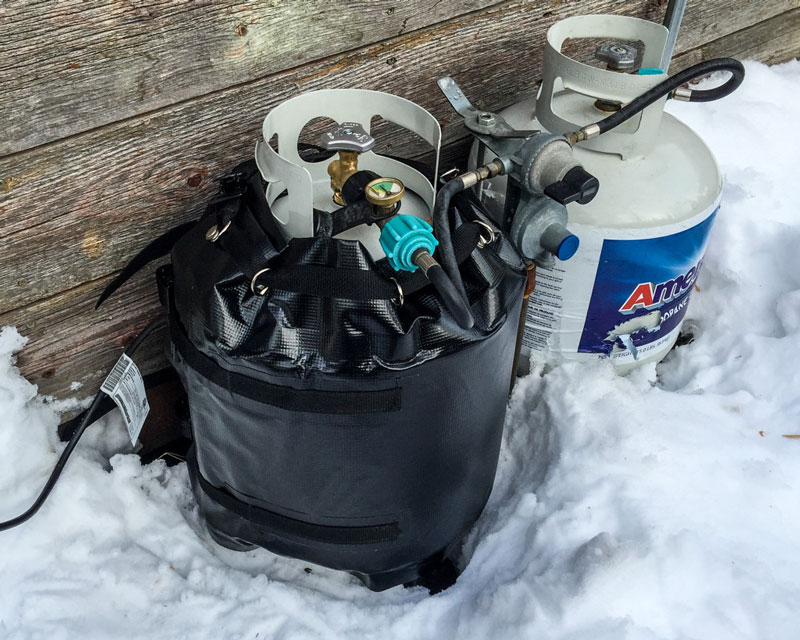We've independently reviewed this article to make sure it's as accurate as we can make it.
To find out more about our article creation and review process, check out our editorial guidelines.
Does your propane tank keep freezing up, and you don’t know why?
You’re not alone! Frozen propane tanks affect thousands of people daily, making them worried and confused.
I know how annoying it can be to have your propane tank keep freezing up, especially when you’re trying to stay cozy in the comfort of your home.
But don’t worry; you’ve come to the right place for answers. You can do several things to prevent your propane tank from freezing up. And the best part is that most solutions are easy and quick.
Ready to get your propane tank back in action? Let’s dive in!
Is a Frozen Propane Tank Dangerous?
Propane tank frost-up is dangerous, but not for the reasons you think.
If you rely on propane to heat your house, then a propane tank frost-up can be dangerous if you live in a region where life-threatening low temperatures are a thing.

A frozen propane tank can’t supply enough heat to keep people warm, which can pose a risk to people in shelters or homes without an additional heating source during snow storms and cold fronts.
It’s always a good idea to keep a backup power generator to keep yourself and others warm in case of propane tank frost-up.
Note: Only those living in extremely cold average temperatures should concern themselves with frozen propane tanks. Propane requires temperatures around -40 to -50 degrees F to freeze, which is extremely rare.
Stopping Your Propane Tank From Freezing Up
Having covered the importance of keeping secondary heat sources handy, let’s dive into how you can keep your propane tank from freezing when you need it most.
#1 Store Your Tank Somewhere Warm
Storing your propane tank somewhere warm sounds simple, and it is if you’re dealing with a smaller propane tank for a couple of appliances. Think about tanks you use for grills, fire pits, and maybe a few other individual appliances.
The kind you can load in your vehicle and take to get refilled or swapped out.

My usual rule is: if you can load the propane tank into a vehicle and take it somewhere to be refilled, you can just as easily disconnect the tank from your appliance and store it.
However, NEVER bring a propane tank inside a house. Propane tanks MUST remain outdoors, usually a minimum of 10′ from a structure. Propane tanks are an explosion hazard, so they cannot be brought indoors for any reason.
Sheds and detached garages are not good places to store propane tanks either because they often contain flammable liquids that will ignite if the tank explodes. Always keep propane tanks at least 10′ away from any buildings people live in, including apartments and condominiums.
Fear not, though; there are steps you can still take to keep even the largest of propane tanks from freezing up.
#2 Keep Your Tank Full of Gas and Pressure
In my experience, keeping your propane tank full and pressurized properly can also keep it from freezing while running. If heat causes expansion, cold naturally causes contraction, and the same is true for propane.
If there’s less propane volume inside the tank, the flow of propane will be impacted. Slowing the movement of gas through the tank and through the attachments and lines.
Propane is naturally cold (it boils at -44°F). So, cold gas moving slower than normal through cold valves and lines in the presence of cold moisture is a recipe for freezing.
To prevent slow gas movement, keep your tank as full as possible at all times, ideally never letting the content drop below 30%.
#3 Give Your Tank a Blanket
Using a blanket can keep your propane tank from freezing while running and also maintain both adequate pressure and efficiency levels.
When it comes to blankets, you can go with an insulated blanket or a heating blanket. An insulated blanket is probably enough if you’re dealing with smaller tanks that you can disconnect and move freely.
However, if you have a bigger tank for more than one appliance or your whole house, you’ll want something more permanent, like a blanket with an electric heating system.

#4 Winter Upkeep
If you have to deal with a propane tank that must remain exposed to cold conditions during the Winter, you need to constantly inspect your system. Don’t just put a blanket on the tank and walk away for the season.
Besides a blanket, routinely make sure the tank and exposed accessories are clear of snow, slush, and ice.
If your propane tank isn’t in use and you’re leaving your home vacant for the Winter, you may want to consider securing the shutoff valve now and then. Doing so will keep the propane tank from freezing while running. However, I understand shutting the tank off isn’t an option if you’re using it daily.
Conclusion/propane-tank-keeps-shutting-off/
One of the many fascinating things about propane is how cold it has to be to freeze. Even if you live in the coldest of climates, propane will not freeze until it hits -306°F in its liquid form. If you’re somewhere that cold, propane is the least of your concerns.
That being said, propane accessories can freeze and can affect their reliability and functionality. In other words, frozen propane accessories can lead to the total inability to use the propane you need.
If you rely on propane for most of your appliances or heating your home, frozen accessories can become a vital concern.
The good news is there are simple steps you can take to prevent your propane tank and accessories from freezing and thus keep your propane appliances in good working order in the coldest of circumstances.
Thanks for reading; if this article was useful and answered your most burning questions, please check out our other incredible resources below and consider subscribing to our newsletter.
Have a great day, and stay warm!
-Craig.







